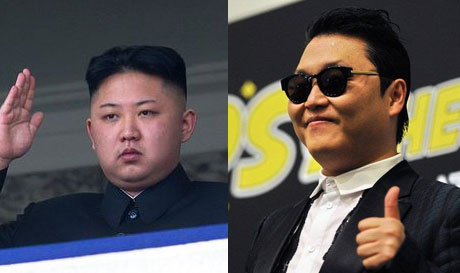Not even Miley Cyrus and her cheeks are keeping a new generation of fat-cheeked Asians from dominating the front pages of the global media.
Take N. Korea’s Baby Boss Kim Jong-un. The past year he’s had more screen acreage than Miley Cyrus, Lindsay Lohan and Kim Kardashian combined. That’s not necessarily a bad thing for us Asians in America. A refresh of the stale media equations will dislodge some of those disempowering old stereotypes.
Kim isn’t the embodiment of an Asian ideal by any means. It’s heinous to execute your ex-girlfriend, fire and possibly execute your uncle and mentor, and gorge nightly on caviar and imported champagne while a fifth of your people starve and two hundred thousand are worked to death in labor camps.
But let’s face it — the mass media dote on people who elevate brattiness into high-wire acts. That dotage transmografies the images associated with highly bad behavior into the bits of cultural debris that, from a future vantage point, resolves into relevance and coolth — the currencies of cultural power and empowerment in our media-drunk age.
Even to a jaded world Kim’s high-wire act has been more engrossing than the foibles of publicity-hungry celebs. For one, Pyongyang Pudge has tangible power, not only over his long-suffering people but over the people of wary neighboring nations. He can evidently lob missiles across the Pacific and set off uranium nukes which, in time, can be miniaturized and placed atop those missiles. The artillery pieces positioned along the DMZ can rain twenty thousand radioactive shells on Seoul per hour to quickly render that city of 24 million uninhabitable for a generation or two. Kim’s small army of hackers can disrupt the banking systems and media of neighboring countries, as they did to S. Korea’s earlier this year.
That kind of power surpasses anything that Justin Bieber or even John Boehner wield. Barack Obama and a few other national leaders may be able to order nuke launches that can actually hit their target. But as sane leaders, none will ever entertain the possibility except as defensive contingencies. In other words, their brat quotients are hovering around zero. That means their power, as awesome as it may be in the abstract, won’t sell pageviews.
Kim’s surreal blend of erratic power, youth, bad haircut, Mao suit and fat cheeks are likely to add up to a cultural icon that will come to recall an era — not unlike Mao Zedong, John Kennedy, the Beatles, Bruce Lee, Richard Nixon and Ho Chi Minh, for example. Kim’s extreme youth makes him more interesting to young people who would otherwise pay little attention to the shenanigans of political leaders.
Kim has become so recognizable that he has even inspired at least one full-time professional impersonator in the person of a Chinese Australian named Howard. Wandering the streets of Hong Kong last month, Howard was instantly recognized as Kim by passersby. Would most Americans instantly recognize and demand photo ops with passing impersonators of Bieber, Katy Perry or Liam Helmsworth?
Kim has added a new edge to the Asian image to help shred old stereotypes of meek conformity, obsequiousness toward elders, and slavish hand-me-down devotion to western culture. Eccentric as are Kim’s Mao suit and palm-tree cut, at least he’s no slave to western culture. A distinctive look is de rigueur for pop icons and Kim’s look is far more unique than those affected by legions of South-Central-inspired pop artists around the world.
In short, the iconizing of Kim is a sledge-hammer blow to the stereotypes born of the suburban imaginations of yesterday’s TV writers and directors.
Another chubby-cheeked Korean who commands media frenzy is Psy, the biggest pop star ever to hit the internet. For two years running his videos have had more views than those of the next three biggest stars combined. Having managed that with just two songs, imagine the media frenzy that will greet the driblets teased from his first international album. They should begin leaking into cyberspace later this week, probably ahead of his 5-day Seoul concert stand.
Psy will inevitably return to the front pages of every pop-culture medium around the world for at least the next several months, and his music will drown out every other pop artist for the duration. With his cherubic cheeks and holiday timing, his image may even become superimposed over that of Santa Claus. It’s about time the old guy looked more Asian.
Like Kim, Psy has inspired impersonators and Halloween costumes. Psy brings pleasure with his zany sense of fun and kooky individuality while Kim appears to be perpetuating misery with his obsession with control. But the duo share one important trait — utter disrespect for the established order. Meek, humble and submissive would be the perfect antonyms for the adjectives that would best describe them. Psy greets packed stadia of adoring fans around the world with the same controlled composure with which Kim greets the masses made to turn out for official events. Like Kim, Psy was born to power. In their messianic public presences, they at times recall another apple-cheeked Korean — the late Reverend Sun Myung-moon.
The domination of the global media by the sheer force of their personalities have made these two fat-cheeked Koreans — love them or hate them — the most visible exponents of the new attitude visibly emerging among today’s generation of Asians, and Asian Americans — the deep-down sense that the world is finally but swiftly turning our way — and that it’s about time.
Kim and Psy are the ultimate in-your-face challenges to those who would dare recall the old mocking images of those comically clueless chubby-cheeked Asians of yesterday’s stereotypes. These two not only seem to have some clues, they’ve assembled them into a plan for conquering, if not the world, at least the world’s collective imagination.

